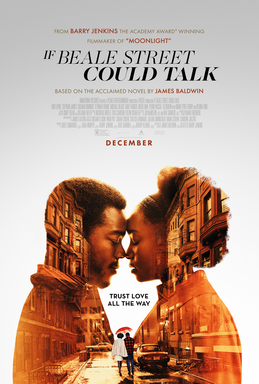Every black American is born in Beale Street. It’s the birth
place of Louis Armstrong and jazz. If Beale Street could talk it would have
some remarkable tales to tell. There would be tales of success, but the tales
of love, racial prejudice and injustice would be the narratives that would be
the most profound. The many examples of innocent black men incarnated for their
crimes is numerous and forms the back bone of Barry Jenkins’ remarkable second
feature. Based on James Baldwin’s novel, If
Beale Street Could Talk is about Tish and her husband’s family desperate
attempts to secure the release of her husband (and father of her child) from
prison for a crime he did not commit.
Quite how Barry Jenkins would follow a Best Picture Oscar winner
(the way the film won the Oscar was as remarkable as the film itself) was
greatly anticipated. He followed it up with a film just as emotionally resonant
and profoundly engaging. He once again uses the same actor speaks to camera technique
that makes us feel we are more than simply watching another person’s story.
It’s something much more. The pain and torment of the two central lovers being
separated from each other is plain for all to see and the blissfulness of the
first few months of love is felt from the dreamlike cinematography and the every
emotion registered on the character’s face.
The central romance of the lifelong friends is gloriously written,
and the performances of Kiki Layne and Stephan James are intimately low key -
more relying on facial movements rather than dramatic performances to convey
emotion. The way the film follows their romance like a fond and cherished memory
does so much to ensure their romance is a strong anchor that makes the whole
situation so devastating. Yet such is the importance of the relationship of
central couple, the film isn’t solely about their relationship with each other.
It’s about the relationship between black kids and their parents, and the
parents’ fear that there is a limit to how much they can protect them from
injustice.
The central paring between Kiki Layne and Stephan James is
exceptional and their tender chemistry perfectly captures their love for each
other. They are well supported also. Each performer has their moment
(especially Regina King) and even those outside the family get their moment. Ed
Skrein oozes menace as the racist cop and Emily Rios is incredibly empathic as
the rape victim coerced into falsely accusing Alonso of rape (it’s a role that,
in a less skilled and sensitive hands, could have painted her as something
other than a victim).
As integral as the love story is it’s a story about
injustice. It’s a story about a family torn apart from a false accusation and a
legal system hell bent on working against truth and justice. Working against a
system where racial bias and prejudice is ingrained into its core to a great struggle
and it’s depressing and infuriating to watch the film with the knowledge that
Alonso will always be branded a rapist by law. The impact this false accusation,
and Alonso’s resulting incarceration, has on the family unit is great, and the
pain it causes and the problems it causes in the future (lack of a male role
model for black children is an issue) is wide ranging.
If Beale Street
Could Talk is an
intensely political film (much more so than Moonlight).
The black and white images show the poverty and police brutality suffered by
black people, and story of injustice is met with outrage and heartbreak. The
score is hauntingly romantic, and the production design makes the era the film
is set feel alive. How do you follow up a Best Picture winner? With a film just
as remarkable, but one the academy didn’t see fit to nominate.
4.5/5




The Wiggles replied to me on Facebook twice
ReplyDelete💛 💙 💜 ❤️